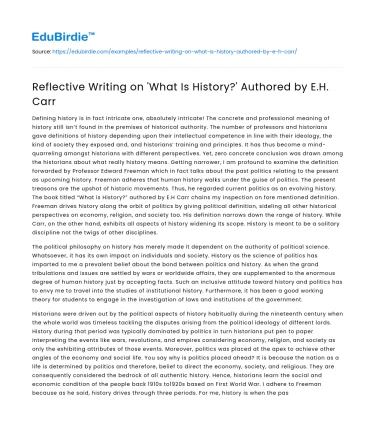Introduction
In the realm of historical inquiry, E.H. Carr's seminal work "What Is History?" serves as a pivotal text that challenges conventional perceptions of historical narratives. Written in 1961, Carr's exploration into the philosophy of history questions the objectivity of historical facts and emphasizes the interpretative nature of historical knowledge. He posits that history is not merely a collection of factual data but a complex interplay between the historian and the past. This essay seeks to reflect on Carr's arguments, examining how his perspectives offer a nuanced understanding of history. By critically engaging with Carr's propositions, we can better appreciate the dynamic relationship between historical events and their interpretation. This reflective writing will delve into Carr's definition of history, the role of the historian, and address counterpoints that fortify his thesis.
The Nature of Historical Facts
One of the central tenets of Carr's argument is the contention that historical facts are not objective truths waiting to be discovered. He asserts, "The belief in a hard core of historical facts existing objectively and independently of the interpretation of the historian is a preposterous fallacy, but one which it is hard to eradicate." Carr emphasizes that facts become historical only when they are selected and interpreted by historians. This selection process is influenced by the historian's context, priorities, and biases, suggesting that history is as much a reflection of the historian as it is of the past. For instance, the portrayal of historical events such as the American Revolution varies significantly depending on whether the narrative is constructed from a British or American perspective. This selection and interpretation underscore Carr's assertion that history is a dialogue between the present and the past, shaped by contemporary values and concerns.
Save your time!
We can take care of your essay
- Proper editing and formatting
- Free revision, title page, and bibliography
- Flexible prices and money-back guarantee
Moreover, Carr's argument is supported by the idea that historical knowledge is provisional and subject to revision. As new evidence emerges and societal values evolve, historians reassess past events, leading to revised interpretations. This dynamic nature of historical understanding challenges the notion of historical objectivity and highlights the importance of critical engagement with historical narratives. By recognizing the interpretative nature of historical facts, Carr invites readers to question the validity of purportedly objective histories and to consider the broader context in which these narratives are constructed.
The Role of the Historian
Another significant aspect of Carr's thesis is the active role of the historian in shaping historical narratives. He argues that historians are not passive recorders of facts but active participants in the creation of history. This perspective challenges traditional views that regard historians as mere conveyors of objective truth. Instead, Carr posits that historians bring their own perspectives, experiences, and biases to their work, influencing the way they interpret and present historical events.
For example, the work of historians like Howard Zinn in "A People's History of the United States" demonstrates how the inclusion of marginalized voices can drastically alter historical narratives. Zinn's approach highlights the experiences of groups often neglected by traditional histories, such as the working class and minorities. This aligns with Carr's assertion that the historian's role is not just to recount events but to engage critically with the past, bringing to light stories that might otherwise remain untold.
While Carr's emphasis on the historian's interpretative role is compelling, it also invites criticism. Some argue that this perspective risks undermining the reliability of historical knowledge, suggesting that it may lead to relativism where any interpretation could be deemed valid. However, Carr counters this by asserting that while historians do interpret facts, they must adhere to rigorous standards of evidence and logical coherence, ensuring that their interpretations are grounded in a critical examination of available data.
Counterarguments and Reaffirmation of Carr's Thesis
Carr's work has not been without its critics. Some historians argue that his emphasis on interpretation over objective facts risks devolving into historical relativism, where the truth becomes subjective and malleable. Critics suggest that this could lead to a scenario where all interpretations are seen as equally valid, potentially undermining the pursuit of historical truth. However, Carr acknowledges this concern and contends that the historian's task is to balance interpretation with evidence-based research. He argues that while complete objectivity is unattainable, historians must strive for a disciplined approach to their work, ensuring that their narratives are supported by a robust analysis of available sources.
Furthermore, Carr's insistence on the significance of the historian's context in shaping historical narratives highlights the evolving nature of historical understanding. As societies change, so too do the questions they pose to the past. This perspective allows for a more dynamic and inclusive approach to history, one that can adapt to new findings and changing societal values. In this way, Carr's thesis does not diminish the importance of historical facts but rather enriches our understanding by emphasizing the complex interplay between facts and interpretation.
Conclusion
In conclusion, E.H. Carr's "What Is History?" offers a profound reflection on the nature of historical inquiry. By challenging the notion of objective historical facts and emphasizing the interpretative role of the historian, Carr invites readers to engage critically with historical narratives. His arguments underscore the importance of understanding history as a dynamic dialogue between the past and the present, shaped by contemporary values and priorities. While his perspectives have sparked debate and criticism, they ultimately enrich our understanding of history as a discipline. By acknowledging the complexities of historical interpretation, Carr's work encourages a more nuanced and inclusive approach to understanding our past, highlighting the ongoing relevance of his insights in contemporary historical scholarship.






 Stuck on your essay?
Stuck on your essay?

